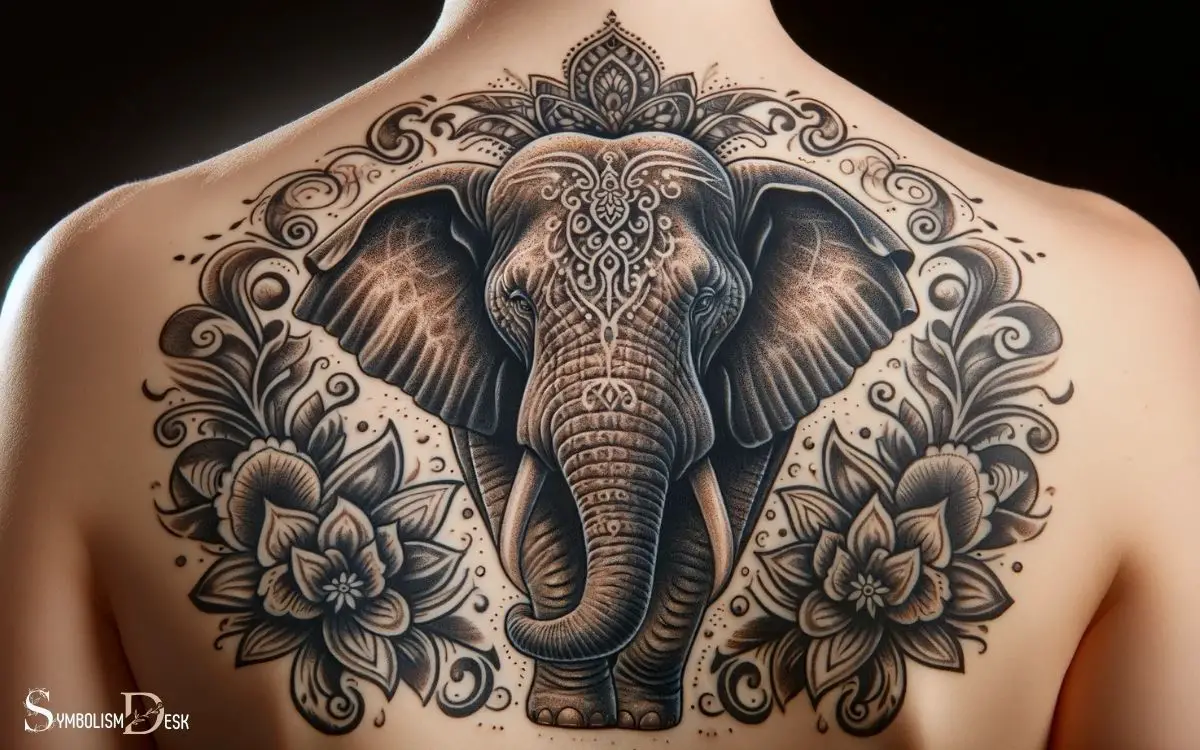What Do Elephant Tattoos Symbolize? Wisdom!
Elephant tattoos symbolize strength, wisdom, memory, luck, prosperity, and strong family ties. These majestic creatures are revered for their size and gentle nature, often representing a deep connection with nature and ancient wisdom.
In different cultures, elephant tattoos also signify protection, good fortune, and overcoming obstacles.
The symbolism of elephant tattoos is rich and varied:
- Strength and Power: Due to their impressive size and strength, elephants symbolize physical and mental strength.
- Wisdom: Elephants are often associated with wisdom and a long memory.
- Family and Community: Their strong familial bonds highlight the importance of relationships and community.
- Good Fortune: In many cultures, elephants with their trunks up are considered a symbol of good luck.
- Prosperity: The elephant is sometimes linked to wealth and prosperity, particularly in business ventures.
- Overcoming Obstacles: Elephants are known to be unstoppable when they choose a path, making them emblematic of determination and perseverance.
In the inked world, elephant tattoos offer a timeless emblem of life’s profundity and the shared journey of resilience and grace.

Key Takeaway
The Cultural Significance of Elephant Tattoos
The elephant tattoo holds significant cultural meaning in various societies around the world.
- In many Eastern cultures, elephants are revered for their wisdom, strength, and longevity. They’re seen as symbols of good luck, prosperity, and protection.
- In Hinduism, the god Ganesh, with the head of an elephant, is worshipped as the remover of obstacles and the deity of intellect and wisdom.
- In African societies, elephants are associated with power, royalty, and leadership, often depicted in ceremonial rituals and tribal art.
- In Thailand, the elephant is a national symbol representing strength, stability, and prosperity.
These cultural associations have made the elephant tattoo a popular choice for individuals seeking to embody these positive attributes.
Understanding the cultural significance of elephant tattoos provides insight into the diverse meanings they hold for different people.
Elephant Tattoos in Different Spiritual Beliefs
Elephant tattoos hold significant meaning in various spiritual beliefs, such as Hinduism and Buddhism.
In Hinduism, the elephant-headed god Ganesha represents wisdom, prosperity, and success, making elephant tattoos a popular choice among followers.
In Buddhism, the elephant is a symbol of mental strength, steadfastness, and responsibility, reflecting the importance of these qualities in the spiritual journey.
Elephant Tattoos in Hinduism
In Hinduism, elephant tattoos hold significant spiritual symbolism and cultural relevance. The elephant is revered as a symbol of wisdom, strength, and prosperity in Hindu mythology and is associated with various deities and stories.
- Ganesha, the elephant-headed god, represents wisdom, intellect, and the removal of obstacles.
- Airavata, the white elephant, is the mount of Lord Indra, the god of weather and war, symbolizing fertility and rain.
- The elephant is also associated with the mythical creature Matang, a symbol of strength and loyalty.
- In Hindu culture, the elephant is often depicted in intricate designs, adorned with jewels and vibrant colors, representing opulence and grandeur.
These symbolic representations make elephant tattoos in Hinduism deeply meaningful and spiritually significant, reflecting the values and beliefs of the culture.
Elephant Symbolism in Buddhism
Buddhism also holds the elephant as a symbol of great significance, with its representation encompassing themes of strength, stability, and mental fortitude.
In Buddhism, the elephant is associated with the historical Buddha’s mother, Queen Maya. According to legend, she dreamt of a pure white elephant before giving birth to Siddhartha Gautama, who later became the Buddha.
This symbolism emphasizes the noble qualities of the elephant, such as wisdom, compassion, and peacefulness, which are integral to Buddhist teachings.
Additionally, the elephant is linked to the concept of mindfulness and mental resilience, as it’s known for its unwavering focus and steady demeanor.
In Buddhism, elephant tattoos can serve as a reminder of these virtues and the path towards spiritual enlightenment.
Symbolism of Elephant Tattoo Designs
Elephant tattoos are often sought after for their symbolism. Many individuals choose them to represent strength and wisdom.
In addition to their personal significance, elephant designs hold cultural importance in various art forms, including traditional and contemporary styles.
The personal meaning and connection to these tattoos can vary widely. This variation makes elephant tattoos a popular choice for those seeking a design that holds deep significance.
Strength and Wisdom Representation
The elephant tattoo symbolizes resilience and intelligence, reflecting the wearer’s inner strength and wisdom.
This tattoo design holds deep symbolism and meaning, resonating with individuals who seek to embody similar characteristics.
Here’s why elephant tattoos represent strength and wisdom:
- Resilience: The elephant’s ability to endure and overcome challenges mirrors the wearer’s resilience in the face of adversity.
- Intelligence: Elephants are known for their remarkable intelligence, symbolizing the wearer’s intellectual prowess and wisdom.
- Family and Community: Elephants are highly social animals, representing the importance of family and community bonds.
- Longevity and Stability: The elephant’s association with longevity and stability reflects the wearer’s desire for a steadfast and enduring existence.
These symbolic elements contribute to the profound significance of elephant tattoos, making them a popular choice for those seeking to convey strength and wisdom through their body art.
Transitioning into the subsequent section about ‘cultural significance in art,’ the cultural context further enriches the symbolism of elephant tattoos.
Cultural Significance in Art
Rooted in various cultural traditions and artistic expressions, elephant tattoo designs hold profound symbolism and significance, reflecting the diverse cultural heritage and artistic interpretations of this revered animal.
Throughout history, elephants have been revered in various societies, representing different cultural, religious, and philosophical concepts.
The table below illustrates the cultural significance of elephant tattoos in different traditions:
| Cultural Tradition | Symbolism |
|---|---|
| Hinduism | Ganesha, the elephant-headed deity, symbolizes wisdom, |
| prosperity, and remover of obstacles. | |
| Buddhism | The white elephant represents mental strength and spiritual |
| growth. | |
| African Culture | Elephants symbolize power, dignity, and longevity. |
These interpretations showcase the versatility and depth of meaning behind elephant tattoos, making them a popular choice for individuals seeking to convey profound cultural symbolism through their body art.
This rich cultural tapestry adds depth and significance to the personal meanings individuals may find in elephant tattoos.
Personal Meaning and Connection
Exploring the personal significance of elephant tattoo designs reveals the intimate connections individuals form with the cultural symbolism and artistic expressions embodied in this revered animal.
The personal meanings and connections behind elephant tattoos are as diverse as the individuals who bear them.
Here are four ways in which people emotionally connect with elephant tattoo designs:
- Strength and Power: Many people choose elephant tattoos to symbolize personal strength and power, drawing inspiration from the elephant’s immense physical presence and unwavering resilience.
- Wisdom and Intelligence: For some, elephant tattoos represent wisdom and intelligence, reflecting their admiration for the elephant’s renowned intelligence and emotional depth.
- Family and Unity: Elephant’s strong familial bonds inspire some individuals to get elephant tattoos as a symbol of their own family unity and loyalty.
- Protection and Good Luck: Many believe that elephant tattoos bring them protection and good luck, serving as a talisman against negativity and obstacles.
Historical and Mythological Context of Elephant Tattoos
The historical and mythological context of elephant tattoos reveals their significance in various cultures throughout history. In many Asian cultures, elephants are symbols of wisdom, strength, and longevity.
- In Hinduism, the god Ganesha, who’s the head of an elephant, is revered as the remover of obstacles and the god of beginnings.
- In Buddhist tradition, the white elephant is considered a symbol of mental strength, patience, and the power of the mind.
- In African cultures, elephants are associated with power, dignity, and leadership. They’re often seen as symbols of protection and good luck. In ancient Mediterranean civilizations, elephants were linked to war and victory due to their use in battle.
Understanding the historical and mythological significance of elephant tattoos provides insight into the deep cultural and spiritual meanings they hold for many people.
This understanding lays a foundation for appreciating the personal and emotional meanings of elephant tattoos.
Personal and Emotional Meanings of Elephant Tattoos
Elephant tattoos often hold personal and emotional significance for individuals, representing qualities such as strength, resilience, and familial bonds. They can serve as a powerful reminder of inner strength and the ability to overcome adversity.
For many, elephant tattoos are deeply meaningful and may symbolize:
- Protection: The elephant is often seen as a guardian and a symbol of protection, making the tattoo a source of comfort and security.
- Connection: Elephants are known for their strong social bonds, and a tattoo can signify the importance of relationships and the interconnectedness of loved ones.
- Endurance: The elephant’s resilience in the face of challenges can inspire individuals to persevere through their own struggles.
- Memory: In some cases, an elephant tattoo may serve as a tribute to a loved one or a cherished memory, honoring the past while moving forward.
Elephant Tattoos as a Representation of Family and Community
Symbolizing strong familial bonds and interconnectedness, elephant tattoos serve as a representation of family and community, embodying the values of unity and support. In many cultures, elephants symbolize the importance of family and community ties.
The matriarchal structure of elephant herds, where females lead and protect the group, mirrors the nurturing and protective role of family matriarchs.
Elephant tattoos often depict a group of elephants, emphasizing the communal aspect of the design.
They can represent the idea of a close-knit family or community, working together for the greater good. The intricate social dynamics of elephant herds also reflect the complexities of human relationships within families and communities.
These tattoos serve as a reminder of the strength and support found in one’s family and community, fostering a sense of belonging and togetherness.
As we delve into modern interpretations of elephant tattoos, these traditional symbols continue to evolve in contemporary tattoo art.
Modern Interpretations of Elephant Tattoos
In contemporary tattoo art, modern interpretations of elephant tattoos continue to expand and adapt, reflecting the evolving significance of these traditional symbols in today’s society.
- Individualism: Many individuals choose elephant tattoos to symbolize personal strength, resilience, and independence.
- Environmental Awareness: In a world increasingly concerned with conservation, elephant tattoos are used to raise awareness about the plight of these majestic creatures.
- Spirituality: Some modern interpretations incorporate elements of spirituality, with elephants representing wisdom, inner peace, and spirituality.
- Artistic Expression: Tattoo artists are constantly reimagining elephant designs, using innovative techniques and styles to create visually striking and meaningful tattoos.
These modern interpretations demonstrate the versatility and enduring appeal of elephant tattoos, as they continue to resonate with individuals in diverse and evolving ways.
Conclusion
Elephant tattoos hold a diverse range of meanings, from spiritual significance to personal symbolism. They’re deeply rooted in cultural and historical contexts, while also serving as a modern representation of family and community.
Whether as a symbol of strength, wisdom, or loyalty, the elephant tattoo continues to captivate and inspire individuals across the world, bridging the gap between ancient traditions and contemporary expressions of art and identity.







